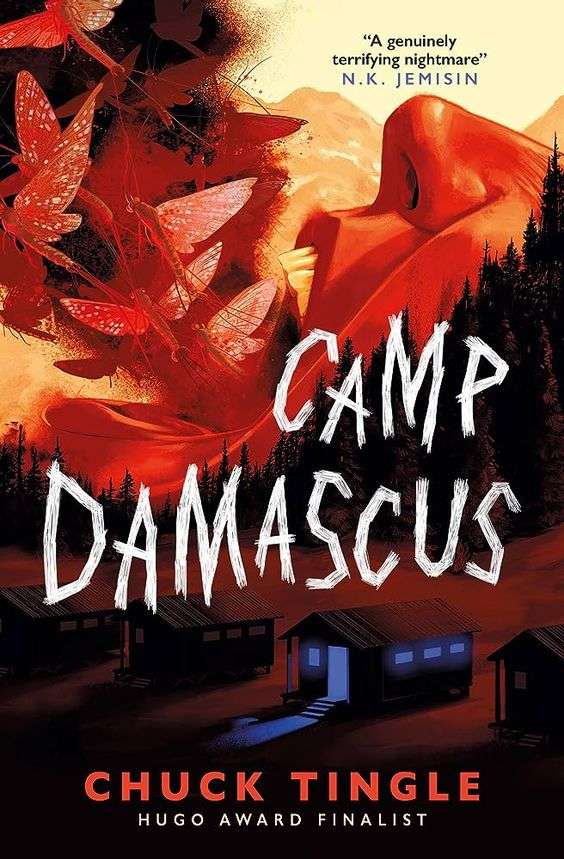We’ve implemented some new protocols around sending us messages via this website. Please email website “at” britishfantasysociety “dot” org for any issues.

For all things fantasy, horror, and speculative fiction
-
Announcement:

Camp Damascus
Camp Damascus by Chuck Tingle from @TitanBooks #BookReview #Horror #Fantasy
Camp Damascus by Chuck Tingle
Titan Books, pb, £8.99
Reviewed by Sarah Deeming

Rose Darling is just an ordinary twenty-year-old. She loves her family and her church and hanging out with her friends. Completely normal. But she also vomits flies, sees people no one else can, and remembers things that have never happened, like having a bedroom door. As Rose’s unusual behaviour intensifies and a friend is killed by one of these people only Rose can see, her parents encourage her to lie to her congregation’s questions, to claim she hasn’t seen anything and has no strange memories. But Rose can’t just pretend everything is OK when it isn’t, and her search for the truth leads her to Camp Damascus, the world’s most effective gay conversion camp.
Camp Damascus is an interesting book, quite short at just under 250 pages, but it packs a lot in and delivers a powerful message. It is a story about love and how the concept of love can be warped to excuse despicable behaviour. There is a steady build of creepiness and horror which is made worse by Rose’s parents witnessing some of it, like the first time she vomits flies, but carrying on as if it is completely normal. Their love makes them want to protect their daughter from other people’s judgement, but in doing so, they restrict her, which only sends her further from them. Rose’s isolation adds to the tension as she is constantly frustrated from finding out what is happening to her.
Rose is a fantastic character and a wonderful example of inclusivity done right. We aren’t told that she has autistic tendencies, but we see it in her behaviour, her obsessive counting during stressful situations and her encyclopedic wealth of facts and information she has absorbed over the years. But while I liked Rose, we didn’t see Rose’s character growth because most of it happens off-page before the story starts, in the pieces of her memory that she has lost. As she regains her memory, she also gets back decisions she has already made. Rose feels deeply, but we don’t see the pain of those decisions, so I felt a little cheated. Some things were too easy.
Another complaint I had with the book is that the ending felt rushed. Throughout, Tingle paces the story well, leading us naturally from one point to another without anything feeling forced. However, as I drew close to the end, I became aware there was a lot to be packed into the remaining few pages, so when it happened, I didn’t feel it got the page space it deserved.
Camp Damascus has a great premise, relatable characters and a fantastic environment, but it deserved more page space to really explore the ending. That said, I was impressed with Tingle’s work and will definitely be on the lookout for more of his work.
Explore the blog:
Blog categories:
Latest Posts:
Tags:
#featured (56) #science fiction (25) Book Review (264) events (44) Fantasy (231) Graphic Novel (13) horror (136) Members (62) Orbit Books (48) profile (43) Romance (17) Science Fiction (50) short stories (28) Titan Books (52) TV Review (15)
All reviews
Latest Reviews:
- THE HOUSE ON THE BORDERLAND by William Hope Hodgson
- Monstrum by Lottie Mills
- Mood Swings by Dave Jeffery
- Yoke of Stars by R.B. Lemberg
- Hera by Jennifer Saint
- The Black Bird Oracle by Deborah Harkness
- RETURN OF THE DWARVES By Markus Heitz
- Delicious in Dungeon
- Toxxic by Jane Hennigan
- THIS ISLAND EARTH: 8 FEATURES FROM THE DRIVE-IN By Dale Bailey
Review tags:
#featured (2) Action (4) Adventure (4) Book Review (28) Fantasy (18) Featured (2) Feminist (2) Gothic Horror (3) Horror (14) Magic (3) Orbit Books (3) Romance (6) Science Fiction (5) Swords and Sorcery (2) Titan Books (7)